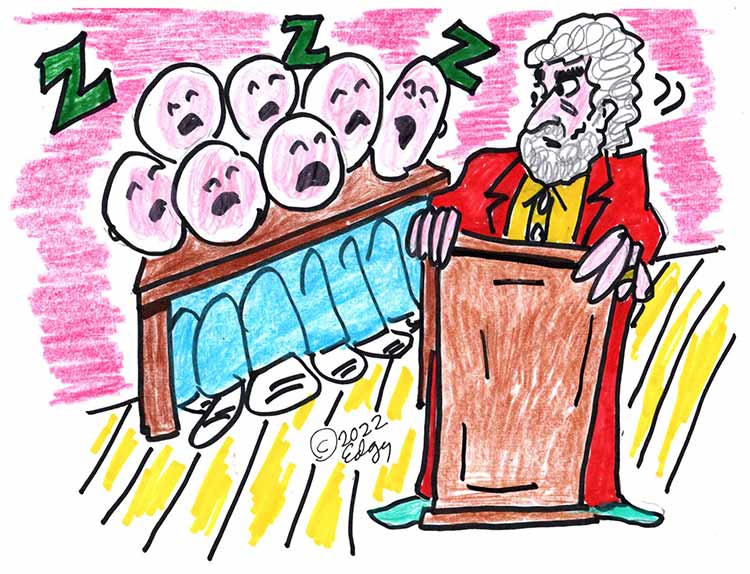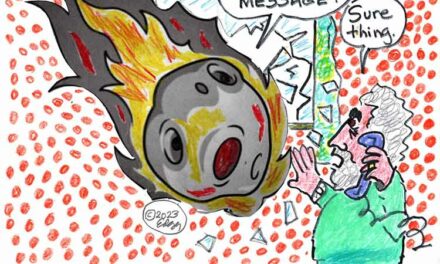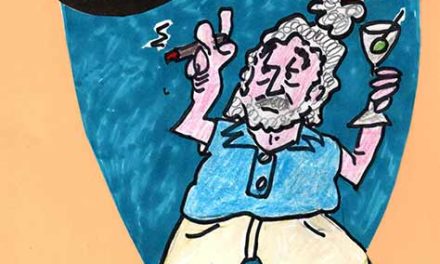Is Boredom a Boring Topic? Wake Up and Let Us Know
Why there’s a social medium and social tedium
By Ed Goldman
High on my list of boring conversation topics is boredom itself.
Yet, after giving it as much thought as I could (until it proved tedious), I’ve decided that boredom is one of the root causes of our increasingly junky culture.
Chairman of the Bored
For example, why do we watch “reality” TV shows that usually depict a reality most of us have never encountered? I very much doubt you’ve ever intentionally allowed yourself to get stranded on an island or married to a Kardashian.
How about game shows like “Wheel of Fortune,” whose main hook is letting us watch people far dumber than we are win fabulous prizes for coming up with the missing word in “AND THEY LIVED HAPPILY—- AFTER”? How bored do we have to be to watch a show like that?
Fashion is an antidote for many people’s world-weariness. Here we are, perfectly content in our clothes (and skin), when some loudmouth we wouldn’t pay attention to even in an empty saloon, even if he were treating, tells us that starting this fall (or winter or spring or summer) we need to start wearing more magenta (or chartreuse or lilac or lemon-yellow) jumpsuits (or overalls or golf shirts or underpants).
This is why the expressions “Sez who?” and “Who died and made you boss?” were invented, incidentally.
I mean, what’s wrong with the clothes on your back, especially if you already have taste? Why should you have to “change it out” in order to be “fashion-forward?” And who comes up with these expressions? I kind of doubt that real-life change agents, like transplant surgeons, say things like, “Let’s change out this guy’s left kidney and give him something a little more renal-forward.”
The news media in particular plays on our sense of ennui. (For younger readers: This is not the French translation of the name Henry—unless Henri is consumed by inertia.)
As you know, “Breaking News” means pretty much the same as, “Wake up, dammit!” It rarely describes something we had no idea of or a situation that just changed for the worse. As distasteful as it is to suggest, the assassination of a head of state is breaking news, whereas the price of gasoline increasing by 40 cents per gallon in the county where you reside really isn’t—unless it’s increasing by five dollars per gallon in the county right next to you, in which case it should be tagged “Obvious Fraud!”
Most of us who read newspapers flip right to the obituary pages in the possible hope that someone famous or a neighbor we didn’t get along with 15 years ago when we lived in a different neighborhood kicked the bucket, possibly taking his list with him. In my town, most people seem to die in time for it to make the Sunday obits. I’m not sure if this phenomenon is coincidental or if funeral homes in most cities hold off on sending in death notices to their local papers until Saturday afternoon.
As an aside, I used to notice that my local paper didn’t report certain celebrity deaths for a few days, even though the Los Angeles Times did so rather promptly. This led me to wonder if Sacramento was perhaps a better place to die than Malibu because you’d cadge a few extra days to put your affairs in order. This presumes, of course, that until a media outlet reports your demise, you go on living—which might be a dubious premise based solely on my lifelong love of newspapers.
These days, computer games are blamed for the collective boredom of millennials, Generation-x, Generation-y and Generation-z.
Even the late-alphabet-labeling of x, y and z implies a certain laziness on the labeler’s part, doesn’t it? As though “millennial” was the last cool word they could come up with, then just started using the last few letters to encapsulate and stereotype people who, in many cases, had only the decades of their birth in common. The labelers were probably too mentally exhausted to start with Generation-a and work their way through the ensuing 18 letters.
But let’s face it, those of us who’ve played Monopoly for what feels like 16 hours on a rainy day know that young people don’t exactly have the corner on the boredom market.
The trouble with a marathon session of Monopoly is that rather than relieve boredom, it cultivates it, often to a fever pitch of irritability. Scrabble can have this same effect—especially if you’re playing against people who think every single move could land them on a bright-red Triple Word Score if only they’d not allow you to rush them.
Finally, I’ve been trying to decide if having a hobby actually constitutes a cry for help. But I don’t think so, even if a hobby is a “pastime,” meaning we use it to pass the time and inch us that much closer to the obituary pages. I have no real hobbies because I’ve tried to monetize every almost diversion I’ve indulged in since I was a kid. For instance, instead of gluing together model cars or airplanes, I wrote and drew comic books and tried to sell them to my parents and their friends. My parents suggested at some point that I should do the comic books just for the love of it (it’s possible I’d caused their friends to start backing away from them).
So I did that for about five minutes. Then I started putting on puppet shows in my backyard for my own friends, charging them a dime each for admission. One afternoon I grossed two dollars and started envisioning that one day my obituary in the Los Angeles Times would describe me as having been a talented puppeteer—whereas by the time I was written up in the Sacramento Bee, my star would have faded and I’d just be recalled as someone who was too bored to marry a Kardashian.
Ed Goldman's column appears almost every Monday, Wednesday and Friday. A former daily columnist for the Sacramento Business Journal, as well as monthly columnist for Sacramento Magazine and Comstock’s Business Magazine, he’s the author of five books, two plays and one musical (so far).













